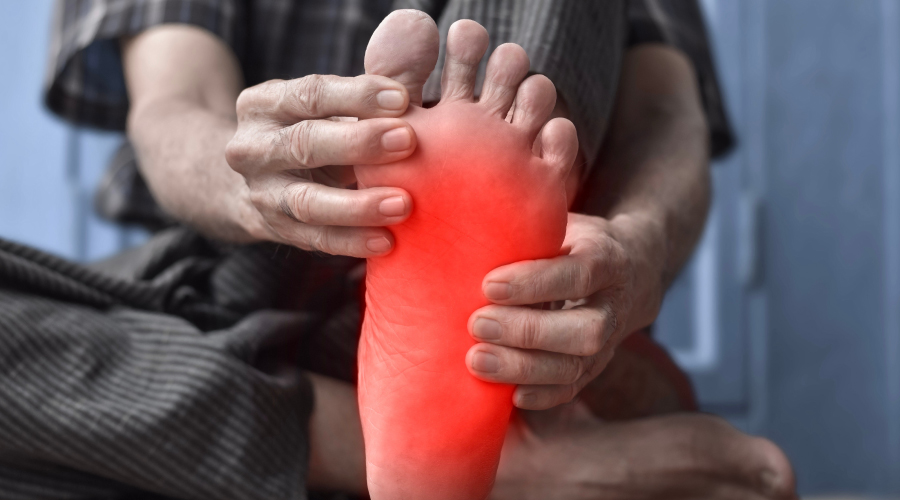

When your feet seem to be asleep or you get that weird pins-and-needles feeling, it can be really annoying and unsettling. Though usually transient numbness in the feet may be a sign of underlying medical conditions.
Knowing the signs, causes, and treatments of this illness will help you take proper care of it when needed and manage it more skillfully. Let’s investigate the possible cause of numbness in feet and how to treat it.
Symptoms of Numbness in Feet
There are various ways that numbness in the feet might appear. Identifying the following symptoms will enable you to choose the appropriate line of action:
- Tingling Pins or Needles: A typical sensation known as “tingling” or “pins and needles” is the impression that tiny needles are pricking your skin.
- Diminished Sensation: In the afflicted area, difficulty feeling pain, touch or warmth.
- Weakness: Feeling as though your legs or feet are weak.
- Burning Sensation: A hot searing sensation that frequently seems tingly.
- Total Numbness: The incapacity to sense any sensation in the afflicted area.
The severity and length of the above-mentioned symptoms might vary and they can affect one or both feet. It is crucial to speak with a doctor if your symptoms are severe or persistent.
Common Causes of Foot Numbness
These are a few typical causes that lead to tingling and numbness in feet:
- Poor Circulation
- Peripheral Artery Disease (PAD): This disease is brought on by artery narrowing which lowers blood flow to the extremities.
- Diabetes: Poor circulation and numbness in feet and hands can result from damage to blood vessels and nerves inflicted by high blood sugar levels.
- Nerve Damage
- Peripheral Neuropathy: This disorder which is frequently linked to diabetes is characterised by damage to the peripheral nerves which results in tingling and numbness.
- Herniated Disc: Numbness in your feet may result from compression of nerves caused by a slipped or ruptured disc in your spine.
- Sciatica: Numbness in feet and pain along the sciatic nerve’s course might result from compression of the nerve which runs from your lower back to your feet.
- Injury
- Trauma: Nerve damage from foot or leg injuries can cause numbness.
- Repetitive Strain: Prolonged pressure on the feet from activities like jogging or prolonged standing might cause transient numbness.
- Nutritional Deficiencies
- Vitamin B12 Deficiency: Vitamin B12 is necessary for healthy nerves; deficiency can result in neuropathy and numbness.
- Magnesium Deficiency: Numbness in feet can result from low magnesium levels that interfere with nerve activity.
Diagnosing Foot Numbness
You should consult a doctor if the numbness in your feet is severe or persistent. A physical body examination and a medical history are typically required for a diagnosis.
Blood tests are often used to check for conditions like diabetes, vitamin deficiencies and problems with thyroid function. Imaging tests such as CT scans, MRIs, or X-rays, help identify structural issues in the body like herniated discs or nerve damage.
So, these tests could be useful in diagnosing and identifying causes of numbness in feet.
Treatment Options
After finding the causes of numbness in the feet you can start the appropriate treatment. Since there are many health issues leading to tingling sensation in feet various treatment methods are available. Scroll down to learn how to stop numbness in legs and feet:
- Medications
- Pain Relievers: Over-the-counter medication like ibuprofen for pain can help manage pain associated with nerve damage.
- Prescription Medications: Medications for neuropathy such as gabapentin or pregabalin can effectively relieve nerve pain and numbness.
- Blood Sugar Control: For diabetes-related numbness maintaining proper blood sugar levels can help alleviate the symptoms of numbness in feet.
- Physical Therapy
- Exercises: Specific exercises can help improve circulation and strengthen the muscles in your feet and legs reducing the frequency of numbness.
- Stretching: Stretching exercises can relieve nerve compression and improve leg muscles health.
- Lifestyle Changes
- Diet: Eating a well-balanced diet abundant in minerals and vitamins can help prevent deficiencies that lead to nerve damage.
- Foot Care: Proper foot hygiene wearing comfortable shoes and avoiding prolonged pressure on your feet can prevent numbness.
Preventive Measures for Numbness in Feet and Legs
If you want to avoid the risk of numbness in feet you can try the following prevention methods:
- Regular Exercise: Staying active improves circulation and overall nerve health.
- Healthy Diet: Ensuring adequate intake of vitamins and minerals supports nerve function.
- Proper Footwear: Wearing supportive and well-fitting shoes can prevent pressure on nerves and improve circulation.
If you are wondering, “Is foot numbness dangerous?”, hop on to the next section.
When to Seek Medical Help?
While occasional numbness in feet can be harmless, persistent or severe symptoms warrant medical attention. Seek immediate care if you experience:
- Sudden numbness following an injury
- Numbness in feet accompanied by weakness or paralysis
- Loss of bladder or bowel control
- Severe pain or swelling.
Final Word
You may experience numbness in your feet due to various factors like poor circulation and nerve damage. You need to observe the symptoms and identify the underlying causes for its effective treatment and prevention. If you experience persistent or severe numbness speak with a doctor for an accurate diagnosis and suitable treatment. By taking proper steps and seeking timely medical care you can manage foot numbness and maintain overall foot health.




